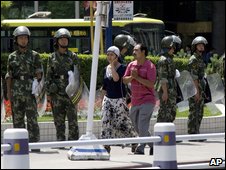|
By Mark Ward
Technology correspondent, BBC News
|


Information about the unrest is leaking out via sites such as Drop.io
|
The Chinese government has made good use of its control over the nation's technological infrastructure to stop the spread of information about events in Urumqi. It is well known that China has a sophisticated system that watches where Chinese people go online and monitors what they say. The control has been extended to search sites, with many people reporting that no results were returned when they typed "Urumqi" into local search engines. It is thought Chinese news sites relied on the official Xinhua news service for updates about events in Urumqi. Many disabled the chance to comment on stories to prevent negative posts about the lack of news. Shirong Chen, China editor on the BBC's World Service, said the official news was appearing faster than during other times of crisis. "What's also noticeable is that the official news agency, Xinhua, has learned from the Lhasa riot in terms of media management," he said. "To be more credible, it released video footage a few hours after the event, not two weeks." Within Urumqi many citizens reported that net access was non-existent, as authorities tried to limit the amount of information emanating from the province itself. Social block The Chinese government also moved to block access to Twitter as well as home-grown alternatives Fanfou and Youku. The Herdict site brings together reports about inaccessible services around the world and, following the Chinese clampdown, it logged almost 150 reports that Twitter was down in China.
 |
 Given that it's a game of cat and mouse they could bring to bear a lot of cats if they had to
Given that it's a game of cat and mouse they could bring to bear a lot of cats if they had to

|
"It really looks like the Chinese government is trying to close every way to information," said Clothilde Le Coz, head of the internet desk at Reporters Without Borders. "Lots of information are actually filtered about the riots. "Videos were apparently posted first on Chinese video sites, then republished on YouTube. "But those Chinese websites are blocked and the internet is not accessible in Urumqi," she said. But, said Ms Le Coz, information about the situation in Urumqi was getting out to the wider world. Sites such as drop.io were acting as rally points for some of the material emerging from the province. The site pointed people to feeds of videos on YouTube, news items on Twitter, as well as other microblogging services such as Jiwai.de and zuosa.com. Harvard professor Jonathan Zittrain, an expert on net censorship and filtering, said the shortcomings of the official Chinese filtering system were exposed during times of crisis. "It is sophisticated but pretty much passive," he said. Rumour mill The sheer amount of ways that information can travel, including if people simply talk to each other or pass around data, means that it is hard to stop all information getting out. Too much control of information could be counter-productive too. "There could be way more rumours floating around in the absence of hard facts. "It does seem that the old strategies are getting leakier and leakier as social media are taking off," he said. It was clear, said Prof Zittrain, that Chinese people were very good at working around the restrictions. Many, he said, used euphemisms to debate supposedly banned subjects.

Authorities have been trying to keep a lid on events in Urumqi
|
This was also partly because humans were doing the monitoring and censoring. "If you just see people going after the stuff that explicitly crosses the line, it could let a lot of other stuff through," he said. At the same time the growing use of blogs, social media, and video sites meant more and more people were equipped with the skills to spread information. Technology was helping too; for example improved translation tools now makes it easier than ever to read sites not written in Chinese. "You have people using social media as part of their daily lives, not just at times of crisis," he said. "It's not like people have to get up to speed with it or be an activist to do it." This, he said, might make people in the Chinese government nervous, as they see the old ways of controlling information breaking down. It could, he speculated, drive the government to take more aggressive measures and impose harsher sentences for those that visit banned sites or write about forbidden subjects. "If you try to go to a blocked site in China it's like a parking ticket type of wrong," he said. The Chinese government could start encouraging its supporters to swamp social media sites with the official line to drown any dissent, he said. It could also go further in its monitoring of the net, mobiles and other ways of communicating. "If they want to put a lot of effort into it they could make some progress," said Prof Zittrain. "Given that it's a game of cat and mouse they could bring to bear a lot of cats if they had to."
|

~RS~q~RS~~RS~z~RS~43~RS~)

~RS~q~RS~~RS~z~RS~43~RS~)
Bookmark with:
What are these?